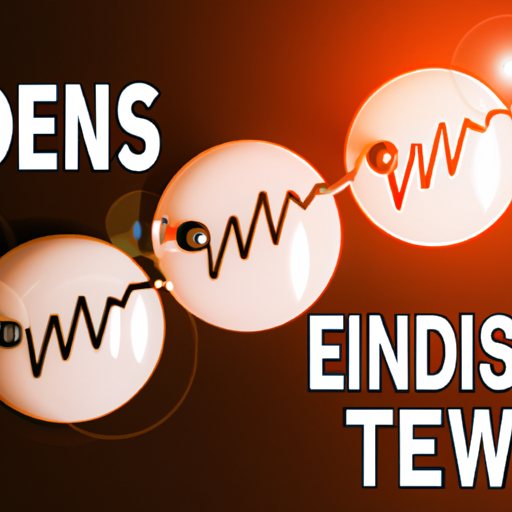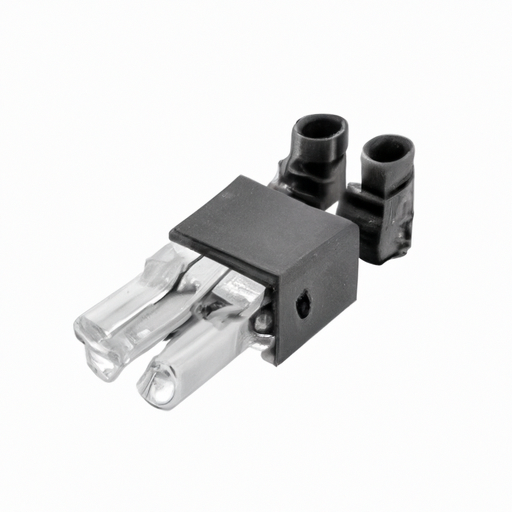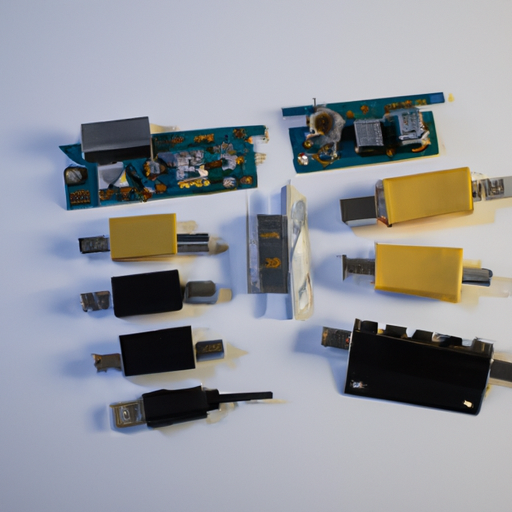What are the development trends in the series capacitor industry?
Development Trends in the Series Capacitor Industry
I. Introduction
A. Definition of Series Capacitors
Series capacitors are electrical components that store energy in an electric field, primarily used to improve the performance of electrical systems. They are connected in series with transmission lines to enhance voltage stability, reduce losses, and improve power quality. By compensating for reactive power, series capacitors play a crucial role in maintaining the efficiency of electrical networks.
B. Importance of Series Capacitors in Electrical Systems
The significance of series capacitors cannot be overstated. They are essential in various applications, including power transmission, renewable energy systems, and electric vehicles (EVs). Their ability to enhance voltage levels and improve power factor makes them indispensable in modern electrical infrastructure, especially as the demand for reliable and efficient energy solutions continues to grow.
C. Purpose of the Outline
This blog post aims to explore the current and future trends in the series capacitor industry, examining technological advancements, market dynamics, regulatory considerations, and the challenges faced by industry stakeholders.
II. Overview of the Series Capacitor Industry
A. Historical Context
1. Evolution of Capacitor Technology
The development of capacitor technology has a rich history, dating back to the invention of the Leyden jar in the 18th century. Over the years, capacitors have evolved significantly, with advancements in materials and manufacturing processes leading to the creation of more efficient and reliable components.
2. Key Milestones in Series Capacitor Development
The introduction of series capacitors in power systems can be traced back to the mid-20th century. Key milestones include the development of high-voltage capacitors, advancements in dielectric materials, and the integration of capacitors into modern power systems to enhance stability and efficiency.
B. Current Market Landscape
1. Major Players in the Industry
The series capacitor industry is characterized by a mix of established players and emerging companies. Major manufacturers include Siemens, ABB, General Electric, and Schneider Electric, all of which are investing in research and development to enhance their product offerings.
2. Market Size and Growth Projections
The global series capacitor market is projected to grow significantly in the coming years, driven by increasing demand for renewable energy solutions, electric vehicles, and smart grid technologies. According to industry reports, the market is expected to reach several billion dollars by the end of the decade.
3. Applications of Series Capacitors
Series capacitors find applications in various sectors, including power generation, transmission, and distribution, as well as in renewable energy systems and electric vehicles. Their versatility makes them suitable for a wide range of applications, contributing to their growing market presence.
III. Technological Advancements
A. Innovations in Materials
1. Development of High-Dielectric Materials
Recent advancements in materials science have led to the development of high-dielectric materials that enhance the performance of series capacitors. These materials allow for higher capacitance values and improved voltage ratings, making capacitors more efficient and reliable.
2. Use of Nanotechnology in Capacitor Design
Nanotechnology is revolutionizing capacitor design by enabling the creation of smaller, more efficient components. By manipulating materials at the nanoscale, manufacturers can produce capacitors with enhanced performance characteristics, such as increased energy density and reduced size.
B. Enhanced Performance Features
1. Improved Voltage Ratings and Capacitance Values
The latest series capacitors are designed to handle higher voltage ratings and capacitance values, making them suitable for demanding applications in power transmission and renewable energy systems. This improvement enhances their reliability and efficiency in various operating conditions.
2. Miniaturization and Compact Designs
As the demand for smaller and more efficient components grows, manufacturers are focusing on miniaturization. Compact designs not only save space but also reduce installation costs and improve overall system performance.
C. Smart Capacitors and IoT Integration
1. Role of Smart Technology in Monitoring and Control
The integration of smart technology into series capacitors allows for real-time monitoring and control. Smart capacitors can communicate with other devices in the electrical system, enabling better management of power quality and efficiency.
2. Benefits of IoT-Enabled Series Capacitors
IoT-enabled series capacitors offer numerous benefits, including predictive maintenance, enhanced performance monitoring, and improved energy management. These features contribute to the overall efficiency and reliability of electrical systems.
IV. Regulatory and Environmental Considerations
A. Compliance with International Standards
1. Overview of Relevant Regulations
The series capacitor industry is subject to various international standards and regulations aimed at ensuring safety, performance, and environmental sustainability. Compliance with these standards is crucial for manufacturers to maintain market competitiveness.
2. Impact on Design and Manufacturing
Regulatory requirements influence the design and manufacturing processes of series capacitors. Manufacturers must invest in research and development to meet these standards while also focusing on innovation and performance enhancement.
B. Sustainability Trends
1. Eco-Friendly Materials and Manufacturing Processes
Sustainability is becoming a key focus in the series capacitor industry. Manufacturers are increasingly adopting eco-friendly materials and processes to reduce their environmental impact and meet consumer demand for sustainable products.
2. Recycling and End-of-Life Management
As the industry evolves, recycling and end-of-life management of series capacitors are gaining importance. Manufacturers are exploring ways to recycle materials and reduce waste, contributing to a more sustainable future.
V. Market Trends and Consumer Demands
A. Increasing Demand for Renewable Energy Solutions
1. Role of Series Capacitors in Wind and Solar Energy Systems
The transition to renewable energy sources is driving demand for series capacitors. They play a vital role in wind and solar energy systems by improving voltage stability and enhancing overall system performance.
2. Integration with Energy Storage Systems
Series capacitors are increasingly being integrated with energy storage systems to enhance their efficiency and reliability. This integration is crucial for managing the intermittent nature of renewable energy sources.
B. Growth in Electric Vehicles (EVs)
1. Importance of Series Capacitors in EV Charging Infrastructure
The growth of electric vehicles is creating new opportunities for series capacitors. They are essential components in EV charging infrastructure, helping to manage power quality and improve charging efficiency.
2. Impact on Battery Management Systems
Series capacitors also play a critical role in battery management systems, ensuring optimal performance and longevity of EV batteries. Their ability to stabilize voltage levels is crucial for the efficient operation of electric vehicles.
C. Industrial Automation and Smart Grids
1. Use of Series Capacitors in Power Quality Improvement
As industries increasingly adopt automation and smart grid technologies, the demand for series capacitors is rising. They are essential for improving power quality and ensuring the stability of electrical systems.
2. Contribution to Grid Stability and Efficiency
Series capacitors contribute to grid stability and efficiency by compensating for reactive power and reducing losses in transmission lines. Their role in modern electrical infrastructure is becoming increasingly important as the demand for reliable energy solutions grows.
VI. Challenges Facing the Series Capacitor Industry
A. Competition from Alternative Technologies
1. Comparison with Other Capacitor Types
The series capacitor industry faces competition from alternative capacitor technologies, such as film and electrolytic capacitors. Each type has its advantages and disadvantages, and manufacturers must differentiate their products to remain competitive.
2. Emerging Technologies and Their Impact
Emerging technologies, such as supercapacitors and solid-state capacitors, pose challenges to the traditional series capacitor market. Manufacturers must adapt to these changes and invest in innovation to stay relevant.
B. Supply Chain Issues
1. Material Shortages and Their Effects
The series capacitor industry is not immune to global supply chain issues. Material shortages can impact production schedules and increase costs, posing challenges for manufacturers.
2. Global Trade Dynamics
Global trade dynamics also play a significant role in the series capacitor industry. Tariffs, trade agreements, and geopolitical tensions can affect the availability and cost of materials, impacting overall market stability.
C. Technological Barriers
1. Limitations in Current Designs
Despite advancements, there are still limitations in current series capacitor designs. Manufacturers must continue to invest in research and development to overcome these barriers and enhance performance.
2. Research and Development Needs
The need for ongoing research and development is critical for the series capacitor industry. Innovations in materials, design, and manufacturing processes are essential to meet the evolving demands of the market.
VII. Future Outlook
A. Predictions for Market Growth
1. Expected Trends in Demand and Supply
The series capacitor market is expected to experience significant growth in the coming years, driven by increasing demand for renewable energy solutions, electric vehicles, and smart grid technologies.
2. Potential Market Disruptors
While the outlook is positive, potential market disruptors, such as emerging technologies and changing consumer preferences, could impact growth. Manufacturers must remain agile and responsive to these changes.
B. Innovations on the Horizon
1. Anticipated Technological Breakthroughs
The future of the series capacitor industry is likely to be shaped by technological breakthroughs in materials and design. Innovations such as advanced nanomaterials and smart technology integration will enhance performance and efficiency.
2. Future Applications and Use Cases
As the industry evolves, new applications and use cases for series capacitors are expected to emerge. Their role in renewable energy systems, electric vehicles, and smart grids will continue to expand.
C. Strategic Recommendations for Industry Stakeholders
1. Investment in R&D
To stay competitive, industry stakeholders should prioritize investment in research and development. This focus will enable manufacturers to innovate and adapt to changing market demands.
2. Collaboration with Technology Partners
Collaboration with technology partners can also drive innovation and enhance product offerings. By working together, manufacturers can leverage expertise and resources to develop cutting-edge solutions.
VIII. Conclusion
A. Summary of Key Trends and Insights
The series capacitor industry is undergoing significant transformation, driven by technological advancements, increasing demand for renewable energy solutions, and the growth of electric vehicles. As the market evolves, manufacturers must adapt to changing consumer preferences and regulatory requirements.
B. The Importance of Adaptation in the Series Capacitor Industry
Adaptation is crucial for success in the series capacitor industry. Manufacturers must remain agile and responsive to emerging trends and challenges to maintain their competitive edge.
C. Final Thoughts on the Future of Series Capacitors
The future of series capacitors is bright, with numerous opportunities for growth and innovation. By embracing technological advancements and focusing on sustainability, the industry can continue to play a vital role in the global energy landscape.
IX. References
A. Academic Journals and Articles
- [Journal of Electrical Engineering](https://www.journalofelectricalengineering.com)
- [IEEE Transactions on Power Electronics](https://ieeexplore.ieee.org/xpl/RecentIssue.jsp?punumber=63)
B. Industry Reports and Market Analysis
- [Global Series Capacitor Market Report 2023](https://www.marketresearch.com)
- [Renewable Energy Market Analysis 2023](https://www.renewableenergyworld.com)
C. Regulatory and Standards Organizations
- [International Electrotechnical Commission (IEC)](https://www.iec.ch)
- [Institute of Electrical and Electronics Engineers (IEEE)](https://www.ieee.org)
This blog post provides a comprehensive overview of the development trends in the series capacitor industry, highlighting the importance of innovation, sustainability, and adaptation in a rapidly changing market.






